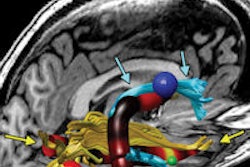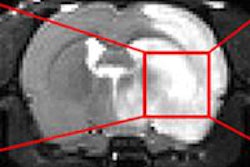Dr. Stamatia Destounis, from Elizabeth Wende Breast Care in Rochester, NY, and colleagues conducted a retrospective review of 296 high-risk breast MR exams in 127 patients performed between 2003 and 2014. The team recorded data on patient age and breast density, lesion size on MR, type of biopsy, and pathology results.
The average patient age at the time of first cancer diagnosis was 40 years, and 76% of the patients had heterogeneously or extremely dense breast tissue. Of 296 exams, 68 (23%) had suspicious findings; of these 68 suspicious exams, 47 (69%) went to needle biopsy, three went to surgery, and 18 were found to be benign at follow-up ultrasound, were no longer discernible when MR biopsy was attempted, or were followed and remained stable, according to Destounis' team.
Pathology results showed 15 cancers (10 invasive and five noninvasive), 30 benign findings, and five atypical findings. Average time between the first cancer diagnosis and the second was about seven years (range, 3 to 16 years).
Seven of the cancers found at screening MR were in the same breast as with the original diagnosis, and eight new cancers were identified in the opposite breast, the researchers wrote. The cancers were detected up to 16 years after initial diagnosis, which establishes the importance of following women who have a history of premenopausal breast cancer, Destounis and colleagues concluded.



















